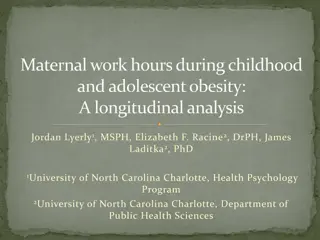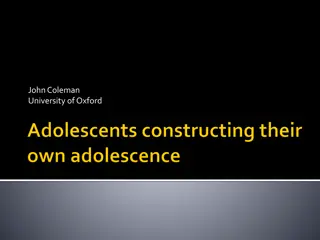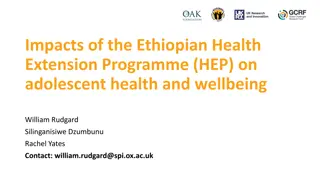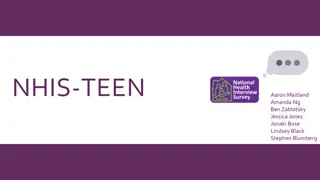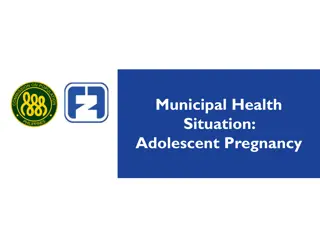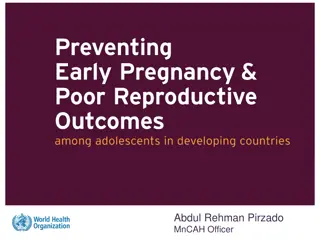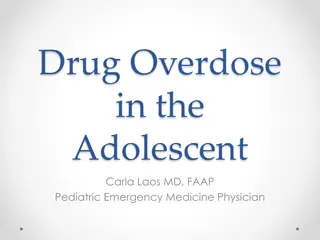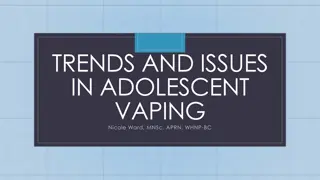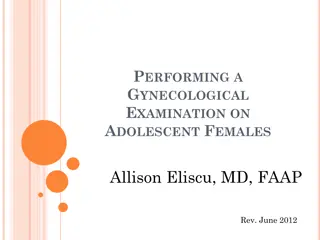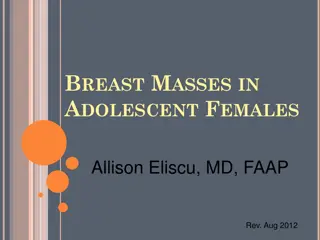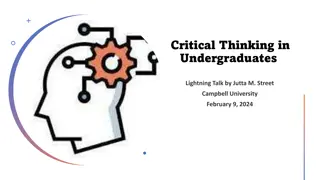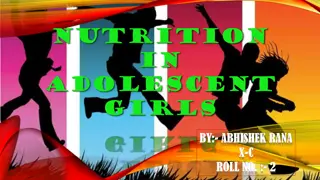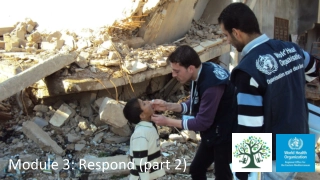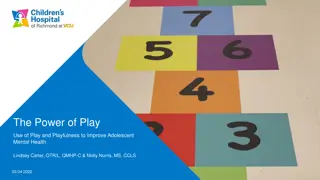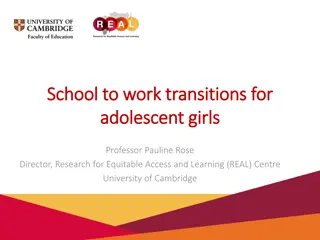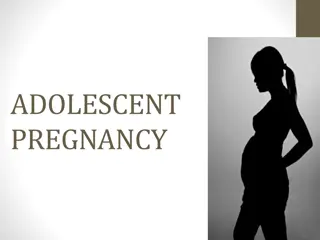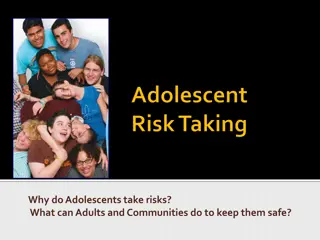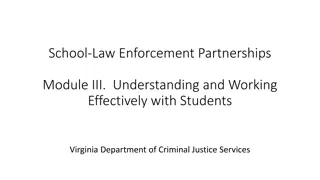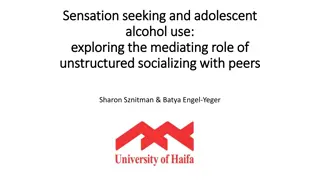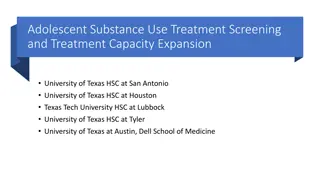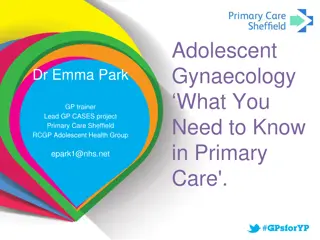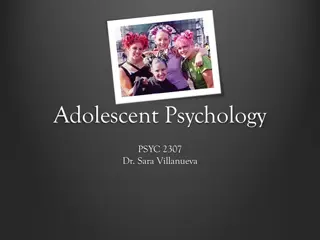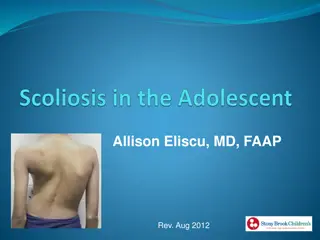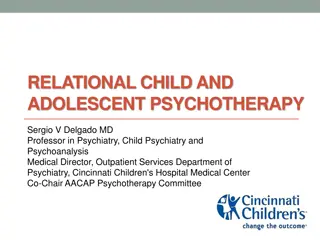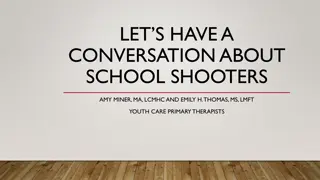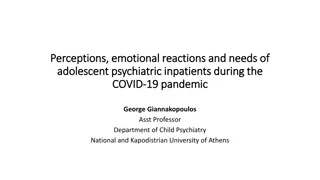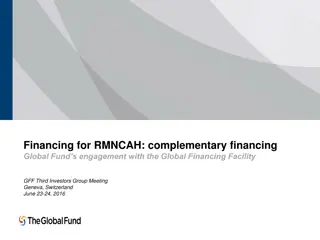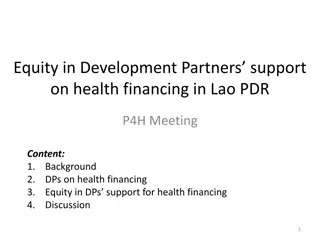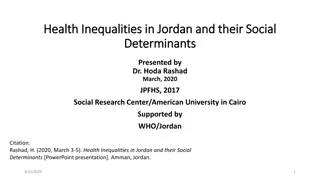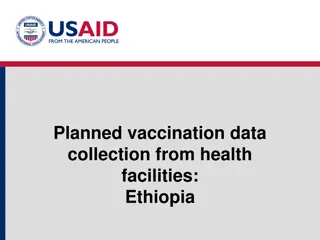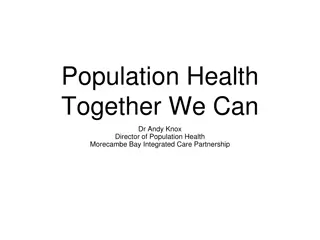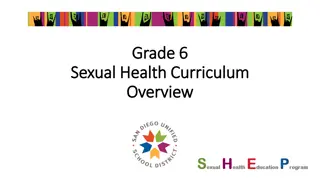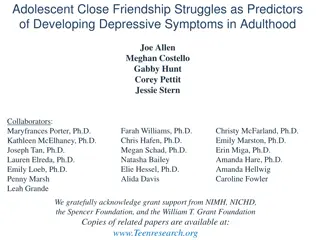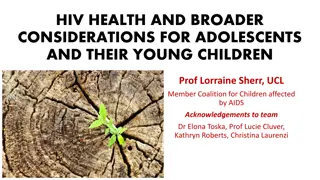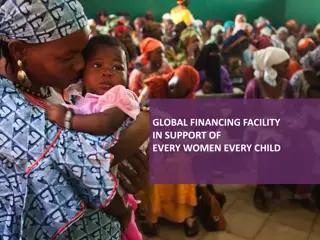Understanding Adolescent Health: Challenges and Importance
Adolescent health is a crucial aspect often overlooked, with statistics highlighting concerning trends such as high death rates, psychiatric disorders, and substance abuse among teenagers. The impact of poor health during adolescence can have lasting effects, making it essential to address barriers to accessing healthcare and improve communication with this age group. Recognizing the specific needs of adolescents and creating adolescent-friendly healthcare practices are vital steps towards safeguarding their well-being and investing in the future of the nation.
Download Presentation

Please find below an Image/Link to download the presentation.
The content on the website is provided AS IS for your information and personal use only. It may not be sold, licensed, or shared on other websites without obtaining consent from the author. Download presentation by click this link. If you encounter any issues during the download, it is possible that the publisher has removed the file from their server.
E N D
Presentation Transcript
video https://www.youtube.com/watch?v=dLuEY6jN6gY Introductions.
CTG Spring term 2018 Module 4 on 17/18thApril. Teenage health Tuesday a different planet Wednesday Sharing management. Module 5 on 8/9thMay. Domestic Violence Tuesday walked into the door Wednesday Dealing with uncertainty Module 6 on 5/6thJune. LD and vulnerable adults Tuesday - they are different to us Wednesday - medical ethics.
Why is adolescent health important? In most developed countries, adolescents constitute 13-15% of the population 6 million aged 10-19 in the UK 25% of young people have seen their GP in the last 3 months distinct health behaviours Death rates in 15-19 year old now exceed those in 1- 4 year olds Accidents, violence and suicide. Teenage pregnancy rates- reduction a priority conception rates in under -16s and -18s have fallen
More statistics Suicide rates have fallen in young men, 16-24 but not in young women Ratios of psychiatric morbidity about static at 10% for 11-16 yr olds but other studies show an increase in emotional and conduct disorders. Cannabis and cigarette smoking rates have improved from about 33 to 20%. Alcohol use has increased in 11-15 year olds and those who drink have increased levels of consumption Association of young people s health 2011
Why does adolescent health matter? The effect of poor health during a teenager s years can last a lifetime. Keeping adolescents healthy is a valuable investment in the nation s future CMO report 2007 Adults, including professionals, know little about the stage of adolescence, and are therefore unaware that young people do have separate and individual needs where health matters are concerned. Dr John Coleman, OBE, University of Oxford 2011
Aims of today To recognise the barriers adolescents may face in accessing primary care services To consider issues around communication with adolescents To highlight areas of clinical concern in adolescent health To discuss how practices could be made more teenage friendly
Why dont GPs always get the whole story from teenagers Group work List as many barriers as you can What particular ethical considerations are important to teenagers? Plenary 10 mins
Barriers for teenagers in accessing primary care CONFIDENTIALITY EMBARRASSED ABOUT P/C COMMUNICATION/ LANGUAGE BARRIERS PRACTICE ENVIRONMENT GEOGRAPHICAL LACK OF INFORMATION ABOUT SERVICES APPOINTMENT SYSTEM
Issues in the consultation Communication/rapport Confidentiality Consent Access 3 way consultations Whom do you identify with? Presenting problem vs hidden agenda vs health promotion
Young people bear most acutely the effects of change in society Inequality Poverty Unemployment Homelessness Family breakdown Drugs and alcohol Sex Changes in transport Changes in leisure activities (electronic devices, Internet) Media pressure Consumer pressure Academic pressure Culture clash/conflict for children of immigrants and minority ethnic groups
Teenage health concerns Group work What are the most common presentations? Plenary
Eating Disorders During adolescence it is normal for boys and girls to gain weight with the physiological process of puberty 40% of girls & 25% of boys start dieting 6 12% become vegetarian Anorexia first develops at around 16-17 yrs of age, bulimia tends to be from age 18 onwards Anorexia has the highest mortality rate of any psychiatric disorder in adolescence of those surviving, only 50% fully recover. 40% of people referred to an eating disorder clinic do not fit neatly into anorexia or bulimia classifications.
SCOFF BMJ (1999) Scoff questionnaire: Do you make yourself sick because you feel uncomfortable. Do you worry you have lost control over how much you eat Have you recently lost more than 1 stone in the past 3 month period Do you believe yourself to be too fat when others say you are too thin Score of 2 and above indicates likely case of anorexia/ bulimia From psychiatry BMI of 17.5 and below is strongly indicative of anorexia, especially if amenorrhoeic.
When to refer: from GP TeamNet Refer to talking changes if mild to moderate bulimia Refer to access services if Sever bulimia or complex eating disorder Anorexia with BMI < 17.5 Consider admission if BMI < 13 Low pulse (< 40bpm) or low BP with postural sx. Low core temp < 35C Muscle power reduced (SUSS < 3)
Obesity Decreasing physical activity and unhealthy eating habits leading to overweight and obese teenagers Also increasing obesity in adults so abnormal eating behaviours engrained early on with norming of image. Obesity has quadrupled in adolescents in the past 30 years. 5% of 12-19 yr old group obese in 1980, now 21% in 2012 Obesity overshadows all other chronic illnesses Nearly 1/3 of all children and adolescents are overweight (but only 1 in 5 children in reception) 4% of obese adolescents may have T2DM
Who to refer from GP TeamNet Can refer children up to age 16 (19 if attending special schools. Obese children above 98th centile can be referred to Consultant led MDT for paediatric obesity Obese children above 91st centile and below 98th centile are accepted into general paediatric dietetics.
Mental Health Young people often experiment with drugs or delinquent behaviours 1 in 12-15 adolescents will self harm (68% increase in last 10 yrs 72% of children in care have behavioural or emotional problems - these are some of the most vulnerable people in our society Alarmingly, however, 70% of children and young people who experience a mental health problem have not had appropriate interventions at a sufficiently early age.
Mental health in teenagers 11.5% or about 510,000 young people aged between 11- 16 years have a mental disorder Conduct disorder is commonest at 6.6% followed by anxiety at 4.4% Anxiety includes OCD, panic disorder and social anxiety Serious depression is estimated at 1.4% Depression can present as behavioural problems, low mood and reduced function at school/ work 1.4% have ADHD
Other mental health issues: Exam stress Cyber bullying can contact ChildLine, thinkUknow Sexting know the law taking or sharing photos or videos of under 18s is illegal. Sleeping problems Bereavement Alcohol do you know the law ?
Why are teens so moody https://www.youtube.com/watch?v=du8siPJ1ZKo
Sexually Transmitted infections Chlamydia rates have seen an increase of 71% in past 10yrs (UK HPA) Syphilis is up by 600% over the same time period, but increased testing STIs are up 38% overall. Higher rates of STI in MSM Current UK recommendations support opportunistic screening for chlamydia in young people (16-24 year olds)
STIs in teenagers The impact of STIs remains greatest in young heterosexuals under the age of 25 years and in men who have sex with men (MSM) The most commonly diagnosed STI was chlamydia, with 206,774 diagnoses made in 2014 The largest proportional increase in diagnoses between 2013 and 2014 were reported for syphilis (33%) and gonorrhoea (19%) - particularly in MSM and probably due mostly to condomless sex rather than greater detection. There was a 4% decrease in diagnoses of genital warts (first episode) between 2013 and 2014
National chlamydia screening programme The NCSP recommends sexually active under-25 year-old men and women should be screened for chlamydia every year, and on change of sexual partner MSM should have a full HIV and STI screen at least annually, or every three months if having condomless sex with new or casual partners Prevention efforts should include ensuring open access to sexual health services and STI screening and should focus on groups at highest risk
NCSP Individuals can significantly reduce their risk of transmitting or being infected with an STI by: Consistently and correctly using condoms until all partners have had a sexual health screen If in a high-risk group, getting screened regularly to ensure early identification and treatment, as these infections are frequently asymptomatic Reducing the number of sexual partners and avoiding overlapping sexual relationships
Teenage Pregnancy UK has highest rate in Western Europe Current rates are the same as those in the 1960s so halved in the last 2 decades (the Guardian 2016) Improvement started from 2004 with some ambitious policies involving friendly family planning services. But 19.7 live births/ 1000 women 15-19 yrs old (Bulgaria worst at 42.6, France next worst and other western Europe at 10.7, Denmark best at 4.4) 50% of under 16s and 33% of 16-19 yr olds used no contraception at first intercourse Infant mortality among babies of teenage mums is 60% higher than in older mums
Drugs & Alcohol Alcohol and tobacco are most commonly misused 20% of 12-13yr olds binge drink rising to 70% of 17yr olds Girls are nearly as likely as boys to experiment with drinking 26% of girls and 21% of boys smoke by 15 yrs of age Half of 16yr olds have tried cannabis 5% use inhalants (glue/paint/petrol) ?? Rate for legal highs - spice synthetic cannabis. Made illegal from May 2016 but highly addictive.
Teenagers and alcohol in the UK Each day in 2009, 36 under 18s were admitted to hospital in the UK But 65 000 young people need treatment in ED every year because of alcohol UK teenagers are amongst those most likely in Europe to report drinking heavily, being intoxicated and experiencing adverse effects from drinking alcohol. Research shows that the earlier a child starts drinking alcohol, the higher their chances of developing alcohol misuse or dependence in their teenage yrs or adult life.
Do you know your units ?? Jordan 16 drinks 4 alcopops when he goes out on a Friday night. Also likes a pint of cider twice per week. Amelia, 18 drinks 1 bottle of white wine with her two mates on a weekend (each night) followed by 4 vodkas/ coke (from the pub) Adam,17 drinks 5 pints of beer (fosters) on a Saturday and Sunday but likes a home whisky three times per week.
In the consultation Relate directly to young children so they re used to it by the time they re teenagers Extra explanation time for common problems (flu, cystitis) Be very patient centred esp with non compliant teenagers with chronic diseases Health promo sensitive to young people s agendas Don t make assumptions Get their mobile phone number
A scheme for assessing troubled teenagers (HEADSS) Home can you talk to your parents? Education ask about actual school performance Activities what do you like doing? Do you have friends you can trust? Drugs (incl smoking and alcohol) explain why you want to know Sex ask permission to ask the questions Suicide risk if concerns makes you feel you should ask
Spacer video https://www.youtube.com/watch?v=yFxNb2XKRRU& nohtml5=False https://www.youtube.com/watch?v=W6CBb3yX9Zs
Julie Julie, 15, books an appointment in the emergency surgery with you. She comes in with another girl who appears to be the same age. They are in school uniform, chewing gum, giggly and not very articulate. The other girl says she s come because she wants to go on the Pill . You can see a packet of cigarettes sticking out of one of their pockets. What issues can you identify and what are you going to do?
Julie She has no idea when her last period was and has had several partners. What are your feelings about this? You think you should do a pregnancy test And guess what....?
Julie She is adamant she won t speak to her parents My mum is very religious and my dad can be a bit of an ogre I want a termination, I can t go through with it, you ve got to help me...
Connor Connor, a 16yr old boy and his mum come to see you. You have a quick look at Connor s notes before you call them in. There is a recent letter from A&E: Intoxicated and vomiting: brought to A&E by friends after drinking >15 units (vodka and alcopops). Bloods ok. Required IV fluids and overnight observation.
Connor Connor lives at home with his mum and 2 younger siblings aged 12 and 10yrs. Mum is divorced and works as a care assistant in a local nursing home. Mum has suffered from depression in the past. Dad works shifts in a bread factory and sees the children some weekends, when he s not working. Connor is quiet and Mum does most of the talking. She seems angry and upset and almost shouts at you: He needs sorting out Doctor. I found some dope in his pocket; he s doing drugs. I just don t know what to do and he won t listen to me. He s out all the time, I never know where he is
Connor How would you approach the consultation with Connor and his mum? Let s give it a go .
Does your child know more than you? Talktofrank.com Drugs information leaflet for parents and carers Healthforteens.co.uk
Ruby Ruby Smithson, 15, lives with her father (a bank manager) and mother (a teacher) in a small town. You know her parents who are good friends of one of your partners in the practice. You are aware that she currently preparing for her GCSEs and you ve been told she would like to study law. She presents with lower abdominal pain associated with urinary frequency which has been present for the last 2 weeks. She seems reluctant to tell the full story... How might you encourage her? What other information would you like to know?
Ruby The pain started after I was at a party and got a bit drunk,...I haven t told my mum and dad cos I think they d be a bit mad with me... You pick up that she s upset and worried and prompt her to continue... She tells you she can t remember much about the party but woke up without many clothes on... You enquire about ICE, she tells you she s worried that something might have happened and that she might have an infection or be pregnant....
Ruby What are you going to say to Ruby? Let s try a role play
James You re doing the late evening surgery and there s an appointment for James, aged 16. He last consulted 3 years ago about mild acne. His parents Anna and Matthew come in, looking worried and tense. He is NOT present. After doing very well in his GCSEs he has started AS levels at school but is not doing well. He is very uncommunicative at home and when not at school he is either out with his friends or in his room. He listens to weird music, seems oddly interested in death and spends a lot of time on the Internet.
James They know he and his mates smoke a lot of cannabis and drink quite a lot of alcohol. They themselves smoked dope at university and drink wine with meals, so they wouldn t have expected to feel so worried about him but they feel something s not right. How do you manage the consultation? What more info do you want about James What are the possible diagnoses and risks of the situation How are you going to get him in?
Amina Amina, 15, has an appointment to see you. In the records there is a recent discharge slip from an admission with a small Paracetamol overdose. You can t find a record of the assessment by the mental health liaison nurse. She comes in with her mother Nazreen, who says that there was a long wait for the mental health assessment when Amina was in the hospital, so she was discharged on condition that she saw the GP.
How can practices be more teenage -friendly There is a new DES out to encourage teenage health clinics in primary care and it is lucrative so the practice manager has brought it to a meeting to discuss. You have been volunteered, as you were not there, to lead this initiative ! In small groups discuss how you will develop this project.


